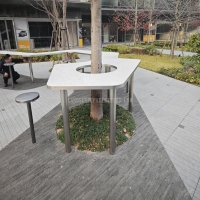Welcome to the website for landscape facilities products and knowledge.
How does the thickness of the countertop material influence the overall durability of a landscape bar counter?
The thickness of countertop material plays a crucial role in determining the long-term durability and performance of landscape bar counters. Thicker materials, typically ranging from 2 to 3 inches, provide significantly enhanced structural integrity that withstands environmental stresses and daily use.
Thicker countertops demonstrate superior resistance to thermal expansion and contraction caused by temperature fluctuations in outdoor settings. This dimensional stability prevents micro-cracks from forming and propagating through the material. Additionally, increased thickness offers greater load-bearing capacity, distributing weight more effectively across the surface and supporting structures beneath.
The relationship between thickness and impact resistance follows a non-linear progression. While a 1-inch thick granite countertop might chip from a falling bar tool, a 2.5-inch version would likely remain undamaged under identical conditions. This enhanced durability becomes particularly important in commercial settings or high-traffic outdoor entertainment areas.
Material composition interacts with thickness to determine overall performance. Natural stone varieties like granite and quartzite benefit disproportionately from increased thickness due to their crystalline structures. For poured concrete countertops, additional thickness allows for better reinforcement integration and reduces the likelihood of stress fractures developing over time.
Installation considerations also shift with thickness. Thicker countertops require more substantial support systems but result in fewer long-term maintenance issues. The initial investment in thicker materials often translates to reduced repair costs and extended service life, making it a economically sound choice for permanent outdoor installations.
Climate factors further emphasize the importance of adequate thickness. In regions experiencing freeze-thaw cycles, thicker materials provide additional buffer against moisture penetration and subsequent damage. The mass of thicker countertops also helps maintain temperature stability, an advantage for both the material's longevity and user comfort.
Ultimately, selecting the appropriate thickness involves balancing aesthetic preferences with practical durability requirements. While thinner countertops might offer cost savings initially, their reduced lifespan in outdoor environments makes thicker alternatives more sustainable and reliable for landscape bar applications.
Related search:

Recommendation
An outdoor bar counter with stainless steel and terrazzo materials in an irregular shape